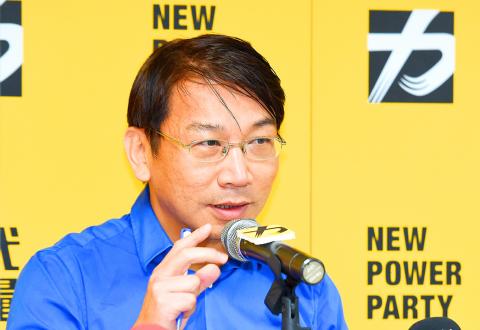New Power Party (NPP) caucus whip Hsu Yung-ming (徐永明) was yesterday elected party chairman after beating Taipei City Councilor Lin Liang-chun (林亮君) in a chairperson by-election.
Speaking at a news conference after the vote, Hsu said he had originally wanted to convince former chairman Chiu Hsien-chih (邱顯智) to reassume the position, but changed his mind after Chiu urged him to take over the chairmanship.
On Tuesday, the party’s decisionmaking committee failed to elect a leader after members voted 4-7 against Lin, the only candidate to have registered for the vote by its Sunday deadline.

Photo: Liao Chen-huei, Taipei Times
Yesterday, seven committee members voted for Hsu, while five voted for Lin, NPP spokesman Chen Chih-ming (陳志明) said.
While the party has yet to schedule a date for Hsu to officially assume the chairmanship, he would immediately take over party affairs, Chen said.
“The NPP’s future strategies will mostly be an extension of what Chiu has laid down,” Hsu said.
The NPP would adhere to its belief in justice and fairness, and seek to carve out a new path different from those of the Chinese Nationalist Party (KMT) and the Democratic Progressive Party (DPP), he said.
While the NPP has faced a number of challenges from within and outside, he would swiftly and effectively prepare the party for the presidential and legislative elections in January next year, he added.
The NPP’s goal for the legislative elections is to perform better than it did in the 2016 elections, he said.
Specifically, he hopes the NPP would receive more than 1 million party votes, he said.
The NPP would nominate more legislative candidates in different constituencies and hopes to continue to play a pivotal role at the legislature, he added.
Asked if he would collaborate with the DPP or other pan-green parties in the elections, Hsu said he would keep an open mind.
“I am always ready to talk and can meet as many times as needed,” he said, adding that he hopes to meet with DPP Chairman Cho Jung-tai (卓榮泰) and DPP caucus whip Ker Chien-ming (柯建銘) to discuss collaborating in the elections as well as at the legislature.

SHIPS, TRAINS AND AUTOMOBILES: The ministry has announced changes to varied transportation industries taking effect soon, with a number of effects for passengers Beginning next month, the post office is canceling signature upon delivery and written inquiry services for international registered small packets in accordance with the new policy of the Universal Postal Union, the Ministry of Transportation and Communications said yesterday. The new policy does not apply to packets that are to be delivered to China, the ministry said. Senders of international registered small packets would receive a NT$10 rebate on postage if the packets are sent from Jan. 1 to March 31, it added. The ministry said that three other policies are also scheduled to take effect next month. International cruise ship operators

NUMBERS IMBALANCE: More than 4 million Taiwanese have visited China this year, while only about half a million Chinese have visited here Beijing has yet to respond to Taiwan’s requests for negotiation over matters related to the recovery of cross-strait tourism, the Tourism Administration said yesterday. Taiwan’s tourism authority issued the statement after Chinese-language daily the China Times reported yesterday that the government’s policy of banning group tours to China does not stop Taiwanese from visiting the country. As of October, more than 4.2 million had traveled to China this year, exceeding last year. Beijing estimated the number of Taiwanese tourists in China could reach 4.5 million this year. By contrast, only 500,000 Chinese tourists are expected in Taiwan, the report said. The report

HORROR STORIES: One victim recounted not realizing they had been stabbed and seeing people bleeding, while another recalled breaking down in tears after fleeing A man on Friday died after he tried to fight the knife-wielding suspect who went on a stabbing spree near two of Taipei’s busiest metro stations, Taipei Mayor Chiang Wan-an (蔣萬安) said. The 57-year-old man, identified by his family name, Yu (余), encountered the suspect at Exit M7 of Taipei Main Station and immediately tried to stop him, but was fatally wounded and later died, Chiang said, calling the incident “heartbreaking.” Yu’s family would receive at least NT$5 million (US$158,584) in compensation through the Taipei Rapid Transit Corp’s (TRTC) insurance coverage, he said after convening an emergency security response meeting yesterday morning. National

The Forestry and Nature Conservation Agency yesterday launched a gift box to market honey “certified by a Formosan black bear” in appreciation of a beekeeper’s amicable interaction with a honey-thieving bear. Beekeeper Chih Ming-chen (池明鎮) in January inspected his bee farm in Hualien County’s Jhuosi Township (卓溪) and found that more than 20 beehives had been destroyed and many hives were eaten, with bear droppings and paw prints near the destroyed hives, the agency said. Chih returned to the farm to move the remaining beehives away that evening when he encountered a Formosan black bear only 20m away, the agency said. The bear